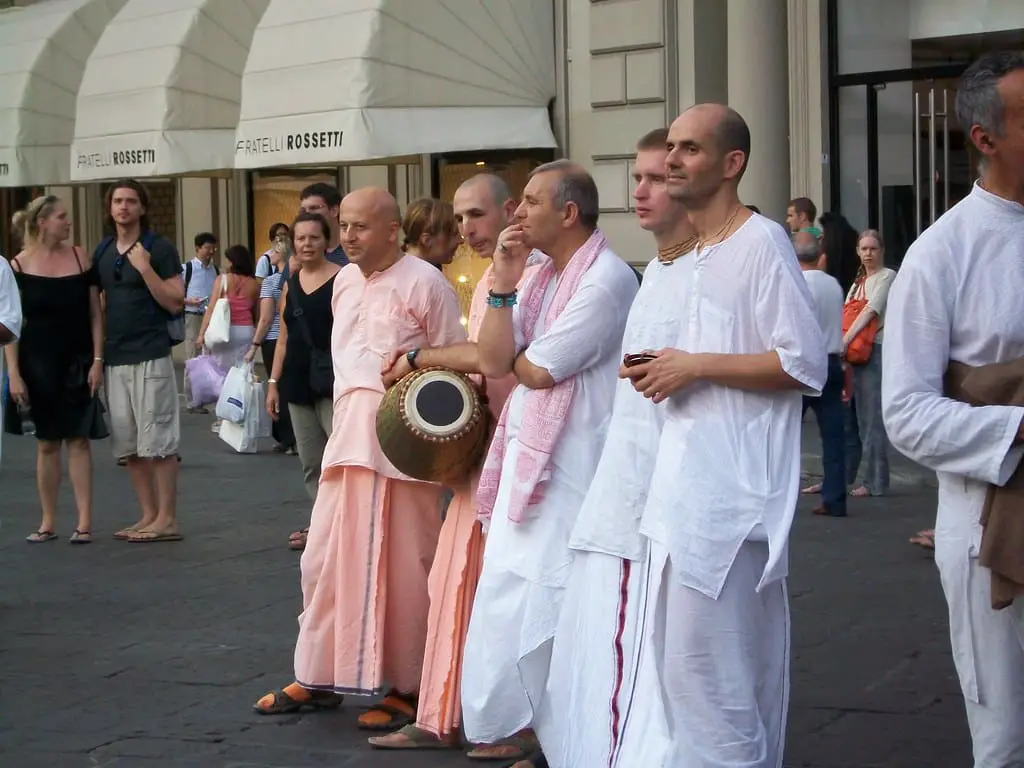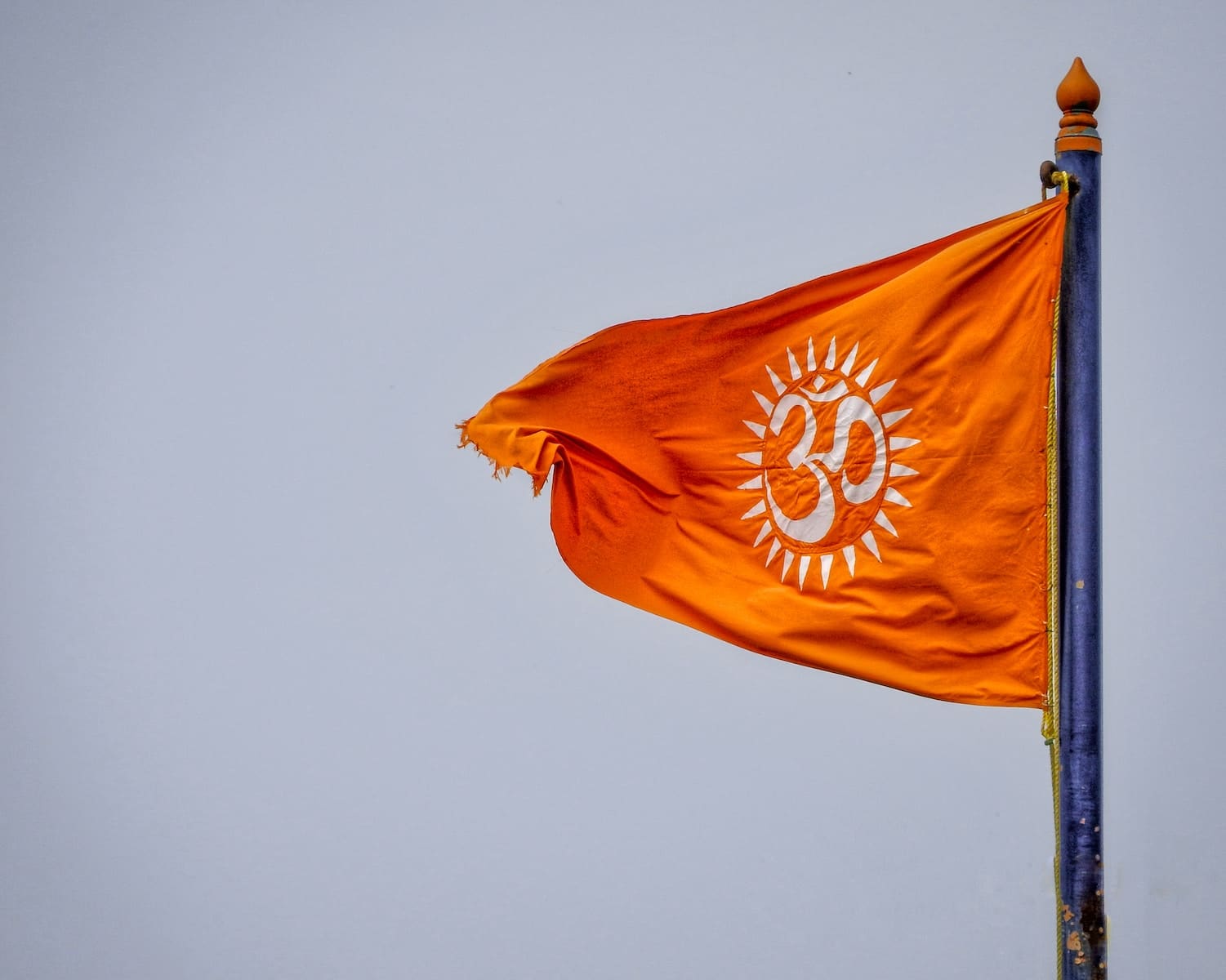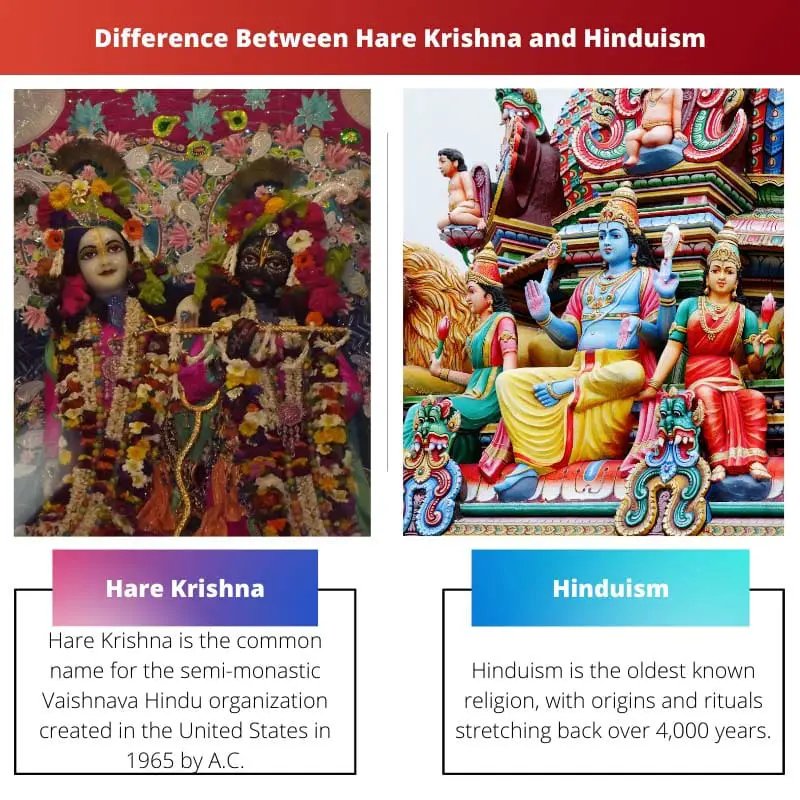Many people mistakenly assume that Hinduism and Hare Krishna are the same religion. However, they aren’t. The first is that Hare Krishna devotees do not consider themselves Hindus. Instead, they highlight that Hare Krishna is an “awareness” rather than a “religion.” They claim that this consciousness is divine consciousness. Hare Krishna’s followers believe that God is one and he is the same for everyone.
Key Takeaways
- Hare Krishna is a specific branch of Hinduism, focused on the worship of Lord Krishna and founded by AC Bhaktivedanta Swami Prabhupada in the 1960s.
- Hinduism is a broader, ancient religion with numerous branches, philosophies, and deities.
- Hare Krishna followers strictly adhere to a vegetarian diet and practice chanting the Hare Krishna mantra, whereas practices vary widely among other branches of Hinduism.
Hare Krishna vs Hinduism
The Hare Krishna movement is a branch of Hinduism established in the 1960s that focuses on devotion to Lord Krishna, while Hinduism is a broader religion with a multitude of beliefs, practices, and sects.

Hare Krishna is the common name for the semi-monastic Vaishnava Hindu organization created in the United States in 1965 by A.C. Bhakti Vedanta (Swami Prabhupada; 1896–1977). This movement emerged from the popular Bengali bhakti yoga tradition, also known as Krishna consciousness or the knowledge of Him, which dates back to the 16th century. Chaitanya Mahaprabhu, the creator of Bhakti yoga, advocated for the practice of spiritual devotion via repeated chanting, particularly of the Hare Krishna mantra.
According to many experts, Hinduism is the oldest known religion, with origins and rituals stretching back over 4,000 years. After Muslims and Christians, Hinduism is the third-largest religion on earth, with around 900 million adherents. India is home to over 95 percent of the world’s Hindus. It’s impossible to decipher the religion’s beginnings and chronology because it has no founder. Hinduism is unusual in that it is a collection of various traditions and concepts rather than a single religion.
Comparison Table
| Parameters of Comparison | Hare Krishna | Hinduism |
|---|---|---|
| Founder | A. C. Bhakti Vedanta, popularly known as Swami Prabhupada, is an Indian religious leader and author who started the Hare Krishna movement in 1965. | Hinduism does not have a single founder, but rather is a synthesis of numerous faiths. |
| Concept | Hare Krishna devotees aspire to be one with the pure truth. They don’t consider their relationship with the almighty God to be a religion. | In addition to Brahman, who is thought to be the highest God power present in all things, Hindus worship a variety of gods and goddesses. |
| Religious Symbol | Images of A.C. Bhakti Vedanta, the movement’s founder, are also key symbols. | The om and the swastika are the two fundamental Hindu symbols. In Sanskrit, the term swastika signifies “good fortune” or “happiness,” and the emblem denotes good luck. |
| Origin | Hare Krishna is a Hindu sect known as Gaudiya Vaishnavism. It gets its name from a hymn that adherents repeat over and over again: Hare Krishna. | The majority of experts think Hinduism began in the Indus Valley. Many Hindus, on the other hand, claim that their religion is ageless and has always been. |
| Holy books | Krishna is the ultimate God, according to the ancient scriptures Bhagavad Gita and Bhagavat Purana, who governs millions of demigods — who are viewed as managers of the cosmic affairs. | Many sacred works are valued by Hindus rather than a single holy book. Around 1500 B.C., the Vedas, the most important holy books, were written. |
What is Hare Krishna?
The International Society of Krishna Consciousness (or ISKCON) is a contemporary Hindu religious organization that goes by the moniker Hare Krishna.
The Hare Krishna movement, which idolizes the Hindu deity Krishna as the Supreme God, originated in the United States in 1965. Their mission is to spread “Krishna awareness,” and one of their key rituals is to chant the Hare Krishna mantra, following which they are addressed. The Hindu Chaitanya movement was founded in 1510 by an ascetic named Sri Krishna Chaitanya. ISKCON is the original home of the Hindu Chaitanya movement. This Krishna lover was known for his fervent devotion, which he demonstrated via dance and song. Chaitanya was regarded as a manifestation of the Supreme Personality of Godhead by his followers.
The Hindu holy book The most important religious literature for Hare Krishna is Bhagavad Gita, which was composed about 250 BC. The story of Arjuna, a warrior, and his encounter with Krishna is told in the Gita, a Hindu epic. This text is taken seriously by Hare Krishnas. The Bhagavad Gita As It Is, which incorporates considerable commentary by Prabhupada, is used and shared by Hare Krishnas. Chaitanya Mahaprabhu, the creator of Bhakti yoga, advocated for the practice of spiritual devotion via repeated chanting, particularly of the Hare Krishna mantra.

What is Hinduism?
Hinduism is a prominent world religion that originated in India and encompassed a wide range of philosophical, religious, and ceremonial traditions. At least five aspects have shaped the Hindu religious tradition throughout Indian religious history: theory, practice, society, tale, and devotion, to name a few. To use a Hindu metaphor, these five aspects are viewed as strands in a complex braid. Furthermore, each strand emerges from a long debate, expansion, and challenge history. As a result, rather than seeking unambiguous unanimity on Hindu teachings, it’s sometimes preferable to look for core sources of friction.
The first of Hinduism’s five strands is theology, which is conveyed in a huge textual legacy rooted in the Veda (“Knowledge”), the earliest core of Hindu religious speech, and arranged predominantly by men of the educated Brahman class over centuries. Several common tensions may be seen here. One is concerned with the divine-human interaction. Another point of contention is the difference between the world-preserving aim of dharma and the liberating ideal of nirvana.
Practice is Hinduism’s second thread. Many Hindus would rank this as the most important. Despite India’s vast variety, a common grammar of ceremonial behaviour binds Hindus from all walks of life.

Main Differences Between Hare Krishna and Hinduism
- Swami Prabhupada, also known as A. C. Bhakti Vedanta, is an Indian religious figure and philosopher who founded the Hare Krishna organization in 1965. Hinduism is a combination of several faiths rather than having a single founder.
- Hare Krishna adherents want to be one with the absolute truth. They do not regard their relationship with the all-powerful God to be religious. Hindus worship several gods and goddesses in addition to Brahman, who is considered the ultimate God force present in all things.
- Symbols of the movement’s founding father, A.C. Bhakti Vedanta, are also prominent. The two primary Hindu emblems are the om and the swastika. The phrase swastika means “good luck” or “joy” in Sanskrit, and the symbol represents great luck.
- Gaudiya Vaishnavism, or Hare Krishna, is a Hindu sect. Hare Krishna is the name of a hymn sung by devotees again and over. Hinduism is said to have originated in the Indus Valley by the large majority of specialists. Numerous Hindus, on the other hand, assert that their faith is timeless and has always existed.
- Dharma is commonly associated with faith among Hindus. However, Harre Krishna believes that faith is not dharma since faith can be modified, but Dharma is unchanging. Furthermore, Harre Krishna believes that religion is a component of a man’s awareness and can’t be converted to or reverted from.





